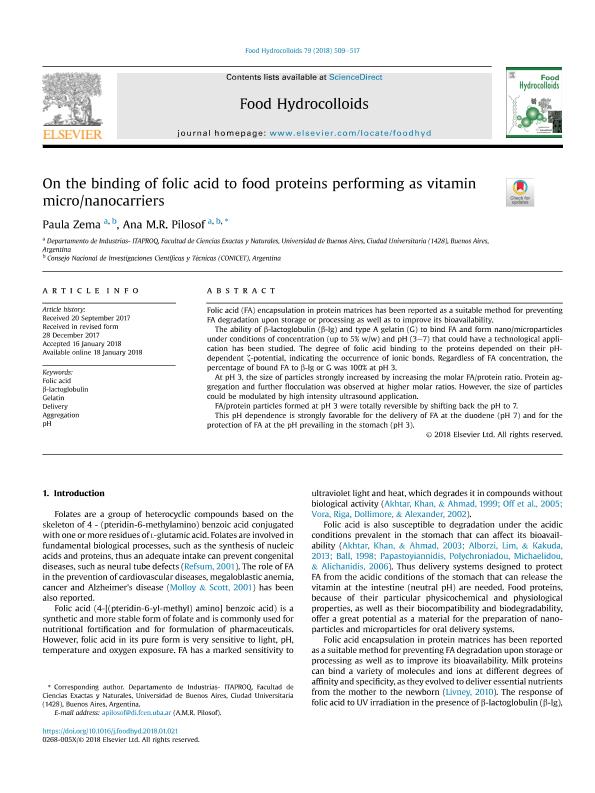Artículo
On the binding of folic acid to food proteins performing as vitamin micro/nanocarriers
Fecha de publicación:
06/2018
Editorial:
Elsevier
Revista:
Food Hydrocolloids
ISSN:
0268-005X
Idioma:
Inglés
Tipo de recurso:
Artículo publicado
Clasificación temática:
Resumen
Folic acid (FA) encapsulation in protein matrices has been reported as a suitable method for preventing FA degradation upon storage or processing as well as to improve its bioavailability. The ability of β-lactoglobulin (β-lg) and type A gelatin (G) to bind FA and form nano/microparticles under conditions of concentration (up to 5% w/w) and pH (3–7) that could have a technological application has been studied. The degree of folic acid binding to the proteins depended on their pH-dependent ζ-potential, indicating the occurrence of ionic bonds. Regardless of FA concentration, the percentage of bound FA to β-lg or G was 100% at pH 3. At pH 3, the size of particles strongly increased by increasing the molar FA/protein ratio. Protein aggregation and further flocculation was observed at higher molar ratios. However, the size of particles could be modulated by high intensity ultrasound application. FA/protein particles formed at pH 3 were totally reversible by shifting back the pH to 7. This pH dependence is strongly favorable for the delivery of FA at the duodene (pH 7) and for the protection of FA at the pH prevailing in the stomach (pH 3).
Palabras clave:
AGGREGATION
,
DELIVERY
,
FOLIC ACID
,
GELATIN
,
PH
,
Β-LACTOGLOBULIN
Archivos asociados
Licencia
Identificadores
Colecciones
Articulos(OCA CIUDAD UNIVERSITARIA)
Articulos de OFICINA DE COORDINACION ADMINISTRATIVA CIUDAD UNIVERSITARIA
Articulos de OFICINA DE COORDINACION ADMINISTRATIVA CIUDAD UNIVERSITARIA
Citación
Zema, Paula Daniela; Pilosof, Ana Maria Renata; On the binding of folic acid to food proteins performing as vitamin micro/nanocarriers; Elsevier; Food Hydrocolloids; 79; 6-2018; 509-517
Compartir
Altmétricas




